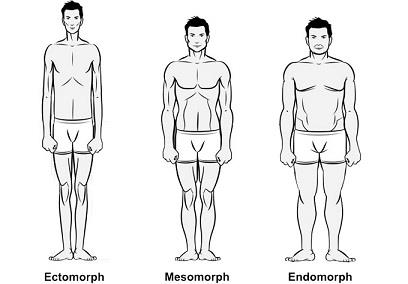 Ectomorph:
Ectomorph:
An ectomorph is a typical skinny guy. Ecto’s have a light build with small joints and lean muscle. Usually ectomorph’s have long thin limbs with stringy muscles. Shoulders tend to be thin with little width.
Typical traits of an ectomorph:
Small “delicate” frame and bone structure
Classic “hardgainer”
Flat chest
Small shoulders
Thin
Lean muscle mass
Finds it hard to gain weight
Fast metabolism
Ectomorphs find it very hard to gain weight. They have a fast metabolism which burns up calories very quickly. Ecto’s need a huge amount of calories in order to gain weight. Workouts should be short and intense focusing on big muscle groups. Supplements are definitely recommended. Ectomorphs should eat before bed to prevent muscle catabolism during the night. Generally, ectomorphs can lose fat very easily which makes cutting back to lean muscle easier for them.
Mesomorph:
A mesomorph has a large bone structure, large muscles and a naturally athletic physique. Mesomorphs are the best body type for bodybuilding. They find it quite easy to gain and lose weight. They are naturally strong which is the perfect platform for building muscle.
Typical traits on a Mesomorph:
Athletic
Generally hard body
Well defined muscles
Rectangular shaped body
Strong
Gains muscle easily
Gains fat more easily than ectomorphs
The mesomorph body type responds the best to weight training. Gains are usually seen very quickly, especially for beginners. The downside to mesomorphs is they gain fat more easily than ectomorphs. This means they must watch their calorie intake. Usually a combination of weight training and cardio works best for mesomorphs.
Endomorph
The endomorph body type is solid and generally soft. Endomorphs gain fat very easily. Endo’s are usually of a shorter build with thick arms and legs. Muscles are strong, especially the upper legs. Endomorphs find they are naturally strong in leg exercises like the squat.
Typical traits of an Endomorph:
Soft and round body
Gains muscle and fat very easily
Is generally short
“Stocky” build
Round physique
Finds it hard to lose fat
Slow metabolism
Muscles not so well defined
When it comes to training endomorphs find it very easy to gain weight. Unfortunately, a large portion of this weight is fat not muscle. To keep fat gain to a minimum, endomorphs must always train cardio as well as weights. Usually supplements may not be needed as long as the person has a high protein intake in their diet.

